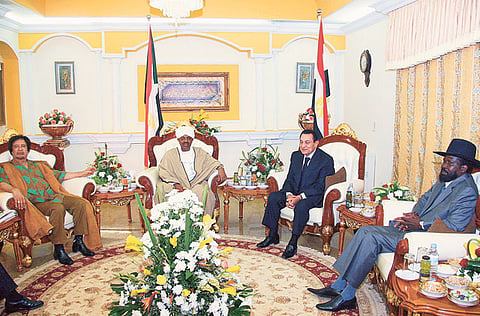Egypt, Libya get it right on Sudan
Promise to recognise results of referendum on secession a boost for regional stability

Sudan's neighbours have said that they will accept the outcome of a referendum in south Sudan on whether the territory will split from Sudan or not. In an important boost to regional stability, both Egypt's President Hosni Mubarak and Libya's President Muammar Gaddafi said they would honour the southerners' decision.
This is an important shift from their previous support for a unified Sudan, and one which will force Sudan's President Omar Al Bashir to think more carefully about any rejection of the referendum.
It is important that both southern and northern leaders prepare for the eventuality of a vote in favour of secession. They need to work on how the transition from one state to two states can be as smooth as possible.
This means they need to appoint people who can sit together and draw up a boundary, which will be highly charged as any boundary means control over people, and natural assets in the ground, such as oil.
It also means that they have to move ahead and review a host of practical issues: like supply of power and water, movement of people, rights of property and investment. They will need to review how businesses which cover the whole of Sudan are able to adapt to working in two states, with all sorts of practical implications such as how to pay taxes.
But thinking about all these steps assumes that the transition to two states will be orderly. It is necessary to be optimistic since without this kind of detailed work no transition can work.
But it is also all too likely that the armies will muster on both sides, and a return to the devastating civil war which ran for decades is a nightmare hanging over Sudan and all its neighbours. All Sudanese, and friends of Sudan in the Arab world and further afield, must work to avoid that dreadful fate.
Sign up for the Daily Briefing
Get the latest news and updates straight to your inbox



